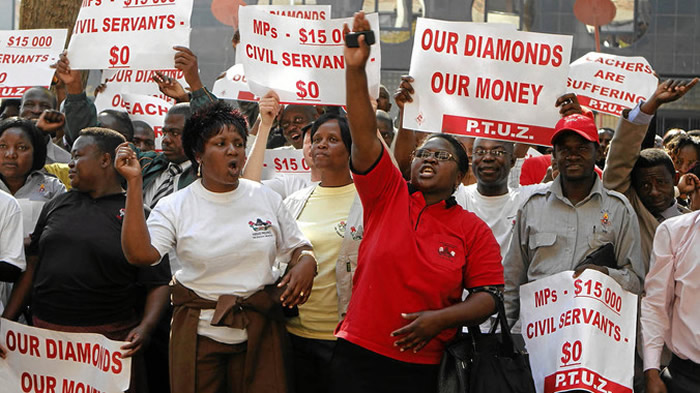By Farayi Machamire and Fungi Kwaramba
President Robert Mugabe’s stone-broke government has once again failed to raise funds to bankroll civil servants’ bonuses, raising the spectre of widespread protests by the restive workers.

Last year, Mugabe — in a typical populist move — vowed that the public service workers would receive their 13th cheques, despite advice from Finance minister Patrick Chinamasa that Treasury had no funds.
Yesterday, government announced staggered pay dates for the civil servants, but failed to give a specific date when it will pay 2016’s bonuses.
In response, Zimbabwe Teachers Association (Zimta) chief executive Sifiso Ndlovu said government must come up with a payment plan because teachers were now anxious about their bonuses.
“Right now, we are implementing a new curriculum which is so taxing in terms of work and planning. The last thing you should worry about are your financial concerns,” he said.
But while Zimta is calling for engagement, the Amalgamated Rural Teachers Union of Zimbabwe (Artuz) has called on all government employees and teachers in particular to engage on a go-slow until their bonuses have been paid.
In a statement, Artuz national president, Obert Masaraure, said the union has to fight for bonuses, adding that the 13th cheques are part of their national share of the cake.
Since last year, government has struggled to pay bonuses due to dwindling national revenue collections, among a myriad of challenges.
George Mushipe, spokesperson of the Apex Council — the umbrella union for State workers — said there are on-going consultations with government over the bonuses matter.
He told the Daily News yesterday that civil servants had turned down government’s proposal to “get residential stands in lieu of bonuses.”
“We are still negotiating with government over bonuses but we had refused government’s proposal to offer us stands,” Mushipe said.
Government’s non-monetary incentive of residential stands is currently on the rocks, with 122 000 signed-up civil servants threatening to pull out following revelations that they will have to pay for the servicing of their stands.
Labour minister Prisca Mupfumira told State media that presently there is no money to pay civil servants their bonuses.
“The government does not have money at the moment. This makes it difficult for us to announce dates. We don’t want to make promises that we will not be able to fulfil,” she said.
“Chinamasa, I and hopefully (Reserve Bank of Zimbabwe governor John) Mangudya will meet on January 25 to map the way forward,” Mupfumira said, adding she would also soon meet with the Apex Council.
For some months now, government has struggled to pay salaries on time, but teachers have been the hardest hit as they are usually the last to be paid.
In a statement issued by the Finance ministry, the health sector would be paid their salaries on January 20 followed by the police and the Zimbabwe Prisons and Correctional Services on January 24.
The education sector will be paid on January 30 while the rest of the civil service will be paid on February 3, followed by pensioners on February 7.
The staff in grant-aided institutions will be the last to be paid on February 10.
Progressive Teachers Union of Zimbabwe (Ptuz) secretary-general Raymond Majongwe raised concerns over government’s “divisive machinations”.
“ . . . we are not happy with the way the issue of our salaries is being handled by both government and the Apex Council,” he said.
“Government has shown they favour their uniformed employees.
“It’s so pathetic for an employer to show obvious bias as government is doing,” he added. Daily News






